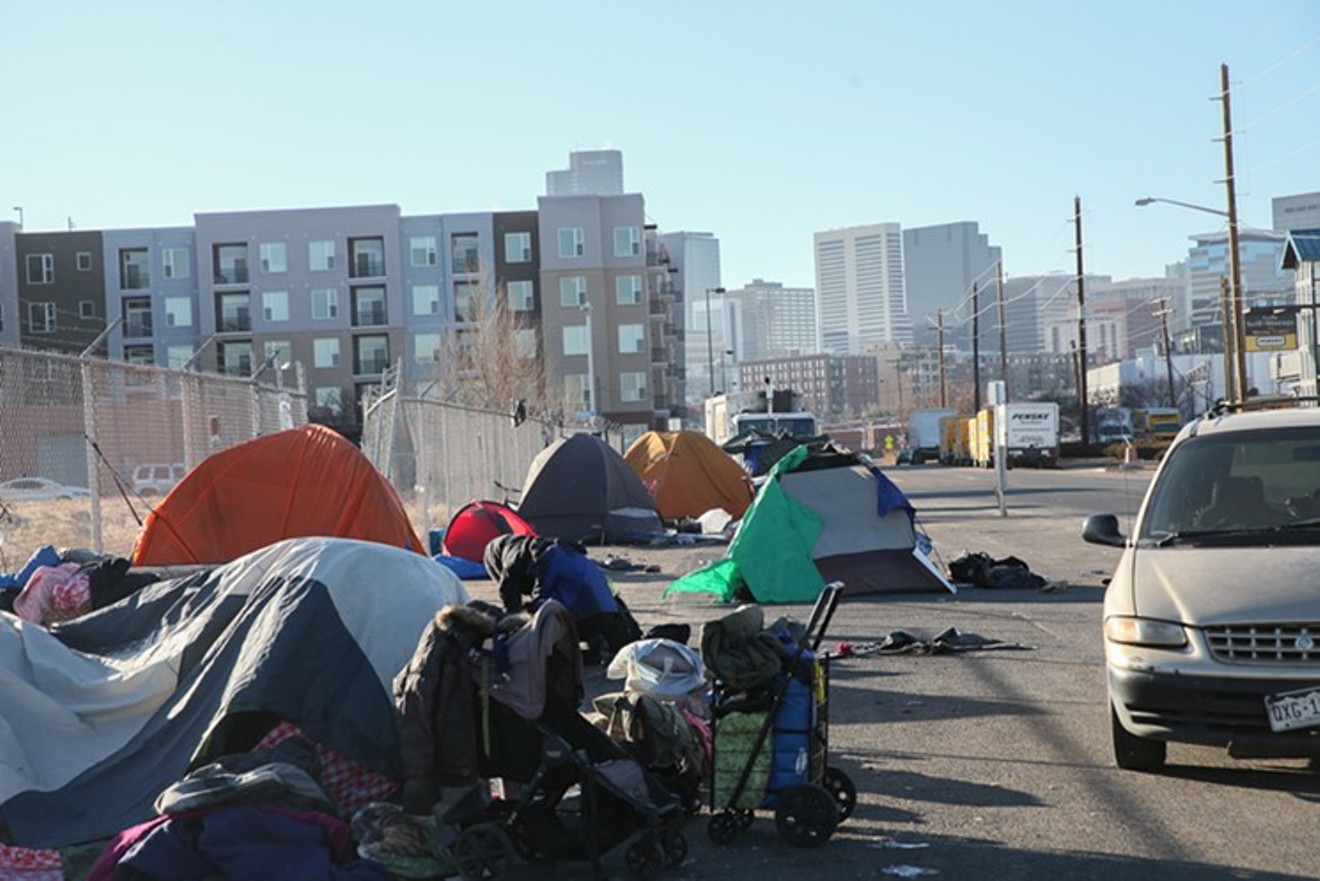Denver's camping ban has been on life support since December 27, when a Denver County judge declared the ordinance that prevented people from sleeping in tents on public land to be unconstitutional.
However, even though the Denver Police Department isn't enforcing the infamous urban camping ban that passed Denver City Council in 2012, the city is still sweeping encampments as part of its enforcement of other regulations that critics charge criminalize homelessness.
The city's Department of Transportation and Infrastructure, formerly known as Public Works, is planning what it refers to as a "large-scale encumbrance removal" today, January 7, in the 2200 block of Stout Street, and also in the 600 block of 24th Street near Sonny Lawson Park.
"We posted these two areas for large-scale cleanups due to the presence of encumbrances and deteriorating public health and safety conditions in these locations. We will be asking people to move so that we can thoroughly clean," Nancy Kuhn, a spokesperson for the Department of Transportation and Infrastructure, says in an email to Westword.
Kuhn notes that the city has been engaging in the cleanups, commonly known as sweeps, since 2016. These two will be in line with an agreement that the city finalized last year in the settlement of a homeless class-action lawsuit, she says.
According to that settlement, the city must post notice seven days before engaging in a large-scale sweep of a homeless encampment.
Part of the city's justification for such sweeps has nothing to do with the camping ban, but instead stems from an ordinance that allows municipal officials to disperse encampments and clean the area on which they're located. The city also cites various health codes when ordering cleanups.
Litter, human and pet waste, and needles are three of the elements that the city's Department of Public Health and Environment looks at when deciding if an encampment presents a public health risk.
"The camping ban was by far the most egregious of all of those laws because it made it illegal to exist anywhere in the entire city of Denver. But there's plenty of laws still on the books that...criminalize homelessness," says Terese Howard, an activist with Denver Homeless Out Loud.
Howard points to laws about public urination, public intoxication and trespassing as disproportionately affecting homeless individuals.
Many of these laws would have been challenged had Initiative 300, also known as the Right to Survive, passed last May. Aside from overturning the camping ban, the initiative, which got walloped by a well-funded opposition, also would have repealed other Denver laws that criminalize homelessness, according to Howard.
About five months after voters overwhelmingly rejected the proposal to limit the criminalization of the city's homeless population, the December 27 ruling by Judge Johnny Barajas sent the city into uncharted territory. For the first time since the urban camping ban was created in 2012, the Denver Police Department stopped enforcing it.
The law remains on the books, though, as Denver has filed notice that it will appeal the court ruling, which sets up a legal battle that could last for a year...or much, much longer.
[
{
"name": "Air - MediumRectangle - Inline Content - Mobile Display Size",
"component": "12017618",
"insertPoint": "2",
"requiredCountToDisplay": "2"
},{
"name": "Editor Picks",
"component": "17242653",
"insertPoint": "4",
"requiredCountToDisplay": "1"
},{
"name": "Inline Links",
"component": "18838239",
"insertPoint": "8th",
"startingPoint": 8,
"requiredCountToDisplay": "7",
"maxInsertions": 25
},{
"name": "Air - MediumRectangle - Combo - Inline Content",
"component": "17261320",
"insertPoint": "8th",
"startingPoint": 8,
"requiredCountToDisplay": "7",
"maxInsertions": 25
},{
"name": "Inline Links",
"component": "18838239",
"insertPoint": "8th",
"startingPoint": 12,
"requiredCountToDisplay": "11",
"maxInsertions": 25
},{
"name": "Air - Leaderboard Tower - Combo - Inline Content",
"component": "17261321",
"insertPoint": "8th",
"startingPoint": 12,
"requiredCountToDisplay": "11",
"maxInsertions": 25
}
]












